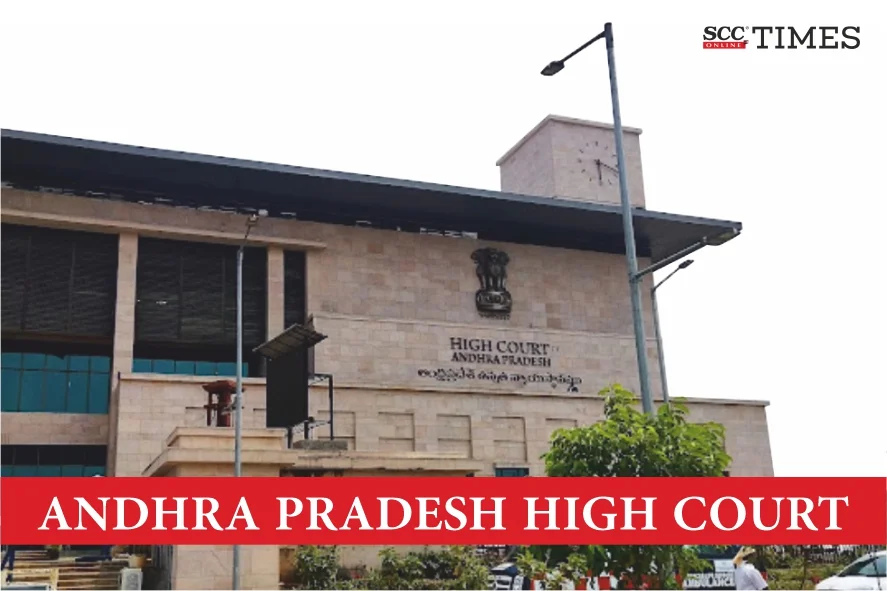Andhra Pradesh High Court: A criminal petition was filed challenging the registration of FIR and subsequent charge sheet pending before the IV Additional District and Sessions Judge-cum-SC/ST Court, Guntur, wherein the petitioners were arraigned as accused for offences under Sections 3(1)(r), 3(1)(s), and 3(2)(va) of the SC/ST (Prevention of Atrocities) Act, 2015 and Sections 341, 506, and 323 read with 34 of the Penal Code, 1860 (IPC). Harinath N., J., allowed the criminal petition and quashed the case pending before the IV Additional District and Sessions Judge — cum — SC & ST Court, Guntur.
The de facto complainant (respondent 2), a Pastor by occupation, filed a complaint on 26-01-2021 before the T. Sandole Police Station alleging that he had been residing in Pittalavanipalem village for 11 years along with his family and had been conducting Sunday prayers for about a decade at the house of a person, which were attended by 20—30 people.
According to the complaint, the 2nd respondent began receiving caste-based abuses and threats from the petitioners through phone calls in December 2020. The complaint further stated that on 03-01-2021, during a Sunday prayer session, the 1st petitioner slapped and punched him. Although he chose to pardon the offender out of Christian faith, another alleged incident occurred on 24-01-2021, when the 2nd respondent was intercepted and allegedly assaulted by the petitioners and about 25 others, who abused him in the name of his caste and threatened to eliminate him and his family. A case was registered against the petitioners under Sections 3(1)(r), 3(1)(s), and 3(2)(va) of the SC/ST (Prevention of Atrocities) Act, 2015 and Sections 341, 506, and 323 read with 34 IPC. A chargesheet was subsequently filed, giving rise to the current proceedings.
The primary contention of the petitioners was that the invocation of provisions of the SC/ST (Prevention of Atrocities) Act was illegal and amounted to an abuse of process. It was argued that the de facto complainant, having converted to Christianity and working as a Pastor for over a decade, ceased to be a member of the Scheduled Caste community as per the Constitution (Scheduled Castes) Order, 1950. This order explicitly excludes those who profess any religion other than Hinduism from the definition of Scheduled Castes.
Reliance was placed on Chinni Appa Rao v. State of A.P., 2015 SCC OnLine Hyd 564 where the Court had quashed proceedings under the SC/ST Act on similar facts involving a converted Christian. Counsel also cited the Supreme Court’s judgment in C. Selvarani v. Special Secretary-cum-District Collector, 2024 SCC OnLine SC 3470, which held that after conversion to Christianity, the individual ceased to belong to their original caste, and claiming caste benefits post-conversion amounted to a fraud on the Constitution.
The petitioners also denied committing any of the alleged acts of abuse or violence and contended that the complainant had been disturbing social harmony in the village by rousing religious and caste sentiments. Counsel for respondent 2 contended that the charge sheet was supported by the statements of ten witnesses, including a medical officer who confirmed injuries to the complainant. It was further argued that a Tahsildar had certified the complainant as belonging to the Hindu-Madiga caste, which is recognized as a Scheduled Caste. Counsel for respondent further argued that caste status does not necessarily dissolve upon conversion and that unless the caste certificate is cancelled, its validity should be accepted.
The Court examined the statutory framework of the SC/ST Act, emphasizing that its protection extends exclusively to members of Scheduled Castes and Tribes as defined under Article 366 of the Constitution. The question under consideration was, whether a person who had voluntarily converted to Christianity and had been functioning as a Pastor could still claim Scheduled Caste status.
A scrutiny of the complaint and statements of witnesses revealed that the 2nd respondent had been professing Christianity and functioning as a Pastor for at least 10 years before the filing of the complaint. The Court noted that multiple witnesses including the complainant’s wife, other Pastors, and villagers confirmed his role in conducting Christian prayer meetings. The Court traced the ecclesiastical and denominational background of Christianity in Andhra Pradesh, elaborating on the various traditions such as Roman Catholics, Protestants, and Pentecostals. It observed that the complainant had served as Treasurer of the Pastors Fellowship in the area—a role not accessible to non-Christians.
Referring to C. Selvarani (supra) and the settled principle that Christianity does not recognize caste, the Court held that upon conversion, the complainant ceased to belong to the Scheduled Caste and could not invoke the provisions of the SC/ST Act. The Court also rejected the argument that the unrevoked caste certificate was sufficient to claim SC status, holding that mere possession of such a certificate does not confer legal entitlement once conversion is admitted.
As to the offences under IPC, the Court found that there was no corroborative evidence beyond the complainant’s statement. Statements of other witnesses showed that there was only a verbal altercation involving villagers questioning the Pastor’s activities. LW.9, who accompanied the complainant, did not corroborate the version of an assault involving 30 persons. Even the charge sheet did not assert such a gathering.
The Court concluded that the complainant, being a pastor and professing Christianity, had forfeited his right to claim Scheduled Caste status, rendering the invocation of the SC/ST (Prevention of Atrocities) Act legally unsustainable. It further held that no prima facie case was made out under the IPC sections either.
[Akkala Rami Reddy v. State of AP, 2025 SCC OnLine AP 1685, decided on 30-04-2025]
Judgment By: Justice Harinath N.
Advocates who appeared in this case:
Counsel for the Petitioner: Sri. J.V. Phaniduth
Counsel for the Respondent(S): Public Prosecutor and Sri. Satheesh Kumar Eerla









